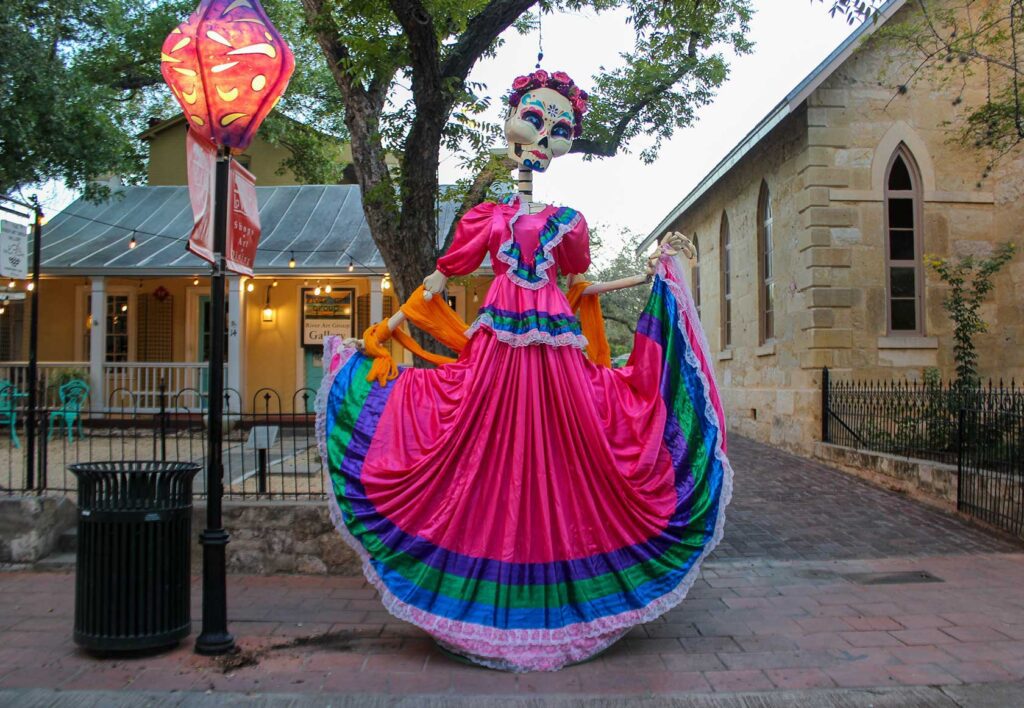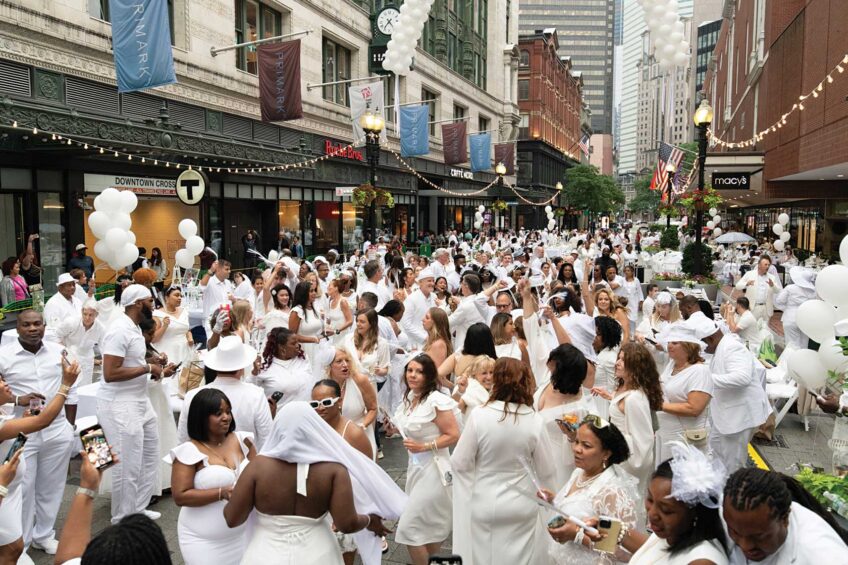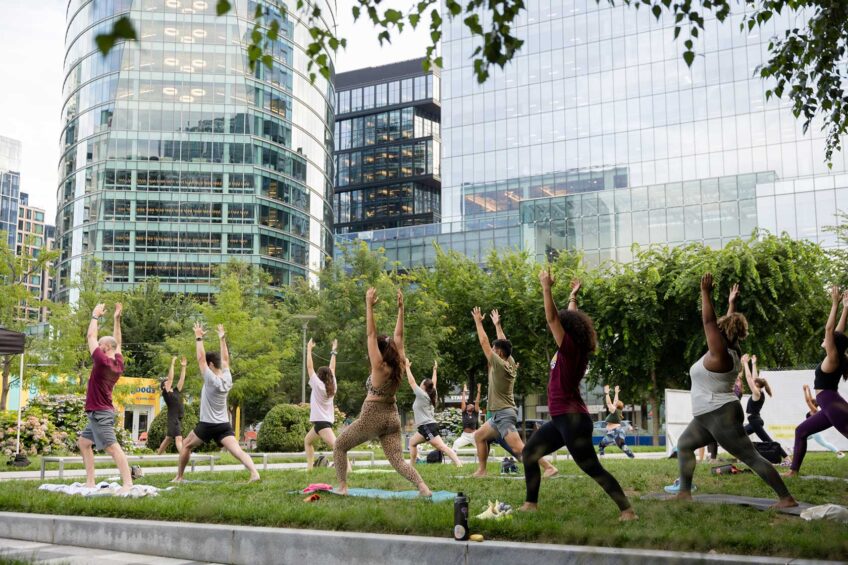
Visitors to San Antonio, Texas, can hear the music of Dia de los Muertos before they see the celebration. The upbeat strums of Mexican folk songs waft through the streets of the historic La Villita neighborhood.

Festive decorations around the historic La
Villita neighborhood where most of the Dia
de los Muertos events take place. PHOTOS: CELINA COLBY
As partygoers get closer, they can spot people dressed as calaveras, or sugar skulls, with brightly colored costumes and white skull face paint. San Antonio hosts the largest Dia de los Muertos (Day of the Dead) celebration in the country, and locals and visitors flock to the Alamo City for the festivities.
Dia de los Muertos is a Mexican holiday celebrated at the end of October and the early days of November. It’s a time to remember and honor friends and family members who have passed away. During the holiday, those loved ones’ spirits are believed to cross back over into the mortal world.

The communal ofrenda (altar) in La Villita pays homage to departed community leaders and other loved ones. PHOTO: CELINA COLBY
Households typically have an altar called an ofrenda where they place pictures of their loved ones and foods and items they ate in life that they might enjoy while visiting. Though the losses are sad, the holiday is a festive one, with music, pan de muerto (a sweet bread made for the holiday) and families coming together.
According to the 2022 U.S. Census, the population of San Antonio is 65.7% Hispanic, and according to Visit San Antonio, people of Mexican origin specifically make up 91.3% of San Antonio’s Hispanic Tejano population. As a result, the traditions of many Mexican immigrants, including Dia de los Muertos, have been preserved in San Antonio’s culture.
Head to La Villita
The festivities are primarily centered in La Villita, one of the oldest parts of the city and the first neighborhood established in what is now San Antonio. During Dia de los Muertos, the streets of stone and adobe structures are lit up with art installations and twinkling string lights. A communal ofrenda honors beloved community members and large calaveras painted by local artists line the streets. At a stage along the San Antonio River Walk, which runs next to La Villita, performers play live music night and day during the festival weekend, and audiences dance to rock, folk and mariachi beats.
The highlight of the festival is a river parade. Viewers line the walkways of the San Antonio River Walk to watch more than 26 elaborately decorated barges process down the river. Each barge represents a different figure or tradition associated with Dia de los Muertos and many are sponsored by local businesses.
The greatest surprise of the weeklong celebration is not the lavish riverboat parade or the colorful calaveras; it’s the leadership behind the festival. The San Antonio celebration has been spearheaded for years by chef Johnny Hernandez, the culinary mind behind more than seven Mexican restaurant concepts in San Antonio.
Hernandez grew up in San Antonio where his father, a Mexican migrant worker, owned Johnny’s Cafeteria and Catering. It was here that Hernandez’s love of food began. Later the chef traveled extensively through Mexico on a mission to absorb the region’s dynamic flavors and deep-seated artistic traditions. His commitment to the arts and culture of the region culminated in this week-long festival, a Dia de los Muertos celebration that’s hyper-local while paying tribute to generations of cultural tradition.
This citywide festival pioneered by Hernandez began in partnership with Visit San Antonio in 2019. Prior to that, the holiday was celebrated on a more individual level.
Beyond the festival
Dia de los Muertos is reason enough to visit San Antonio, but there’s plenty more to experience in the city between tequila tastings at the Herradura Lounge and shopping at the Catrina Artisan Market in La Villita.
To get your bearings, whip around the city in the sidecar of a Vespa on a San Antonio Sidecars tour. Run by the Alamo City native Mancha family, the tour takes visitors through historic and newly developed areas of the city and past some of the most vibrant pieces of public art in town, with a few key stops for coffee and tacos along the way.
Foodies flock to San Antonio for the diverse cuisine. In one day you can sample traditional German breakfast at Schilo’s, the oldest restaurant in San Antonio, taste authentic Mexican dishes at Casa Hernán and carry a craft cocktail through an interactive art exhibit at Hopscotch. One of San Antonio’s most innovative chefs, six-time James Beard Award finalist Steve McHugh, owns two restaurants in town. Landrace, the most recent addition to this portfolio, celebrates regional Texas ingredients and sources from local heritage growers.
Though Boston has a significantly smaller Mexican population (6%, according to Boston Indicators), the community celebrates Dia de los Muertos in full force here, too. One of the largest celebrations is the Day of the Dead Celebration at the Peabody Museum of Archaeology and Ethnology at Harvard University. Guests can hear live music, sample Mexican foods associated with the holiday and learn about the history behind the celebration at this family-friendly event.
Dia de los Muertos is rooted in Mexican culture, but all are welcome at both the Peabody Museum and the San Antonio celebrations. Though languages may differ, honoring ancestors and dancing to an infectious musical beat are universal.









